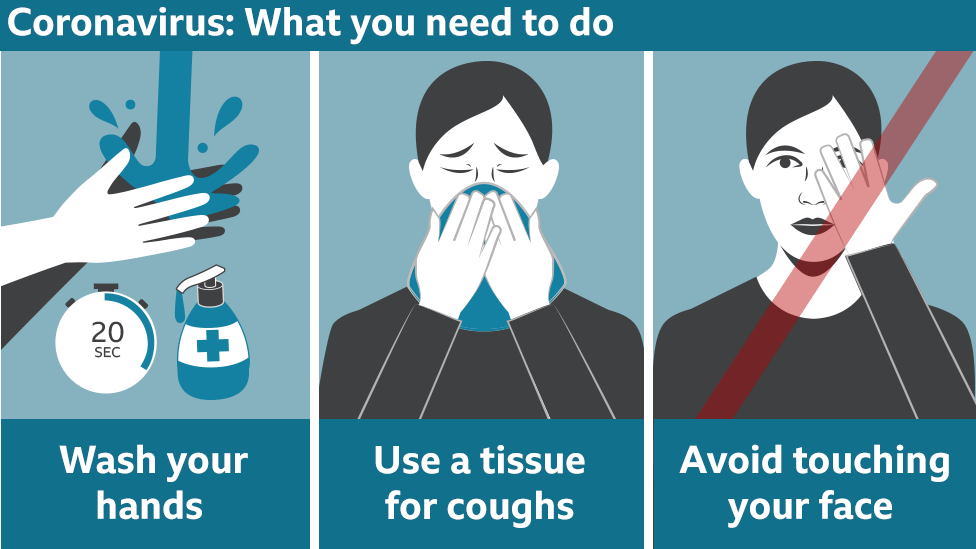
Coronavirus has spread to more than 60 countries, including the UK.
So, what is the disease and what can you do to protect yourself?
What are the coronavirus symptoms?
Coronavirus is a respiratory disease which seems to start with a fever, followed by a dry cough. After a week, it leads to shortness of breath and some patients require hospital treatment.
These symptoms do not necessarily mean you have the illness. They are similar to those for much more common viruses, such as colds and flu.
In more severe cases, coronavirus can cause pneumonia, severe acute respiratory syndrome, multiple organ failure and even death.
Older people, and people with pre-existing medical conditions (such as asthma, diabetes, heart disease), are more likely to become severely ill.
The incubation period – between infection and showing any symptoms – lasts up to 14 days, the World Health Organization (WHO) says. But some researchers say it may be up to 24 days.
How do I protect myself?
Regular and thorough hand washing is crucial in the fight to avoid picking up the disease, health agencies say.
It is not yet known exactly how coronavirus spreads from person to person. However, similar viruses are spread via droplets, such as those produced when an infected person coughs or sneezes.
So, coughing and sneezing into tissues, not touching your face with unwashed hands, and trying to avoid close contact with infected people are important.
Face masks do not provide effective protection against coronavirus, according to medical experts.
What should I do if I think I have coronavirus?
The NHS says the risk to individuals in the UK remains low.
But people who think they may be affected by coronavirus need to call the NHS 111 phone service for further advice. They should not go to their GP, or A&E.
If you have come into contact with somebody who may be infected, you may be told to self-isolate. People needing to do so should take “common-sense” steps to avoid close contact with other people, says Public Health England.
Advice for people who have travelled back to the UK from the main affected areas and some other countries has been issued by the government. Full details of the countries concerned and whether you need to self-isolate are available here.
Other countries have their own measures in place. For example, the US Centre for Disease Control and Prevention advises people showing symptoms to call their healthcare provider, and those who are mildly ill to self-isolate.
The World Health Organization has also issued advice for the public.
What do I need to know about the coronavirus?
How fast is it spreading?
Hundreds of new cases are being reported worldwide each day. However, it is thought health agencies may be unaware of many cases.
After starting in China, coronavirus is now spreading fast in countries like South Korea, Italy and Iran.
How deadly is coronavirus and will I get better?
Four out of five people who contract coronavirus will only experience mild symptoms, a WHO examination of data from 56,000 patients says. It suggests:
- 80% develop mild symptoms
- 14% develop severe symptoms
- 6% become critically ill
The proportion dying from the disease appears low (between 1% and 2%) – but the figures are unreliable.
Thousands are still being treated but may go on to die – so the death rate could be higher. But it is also unclear how many mild cases remain unreported – so the death rate could also be lower.
To put this into context, about one billion people catch influenza every year, with between 290,000 and 650,000 deaths. The severity of flu changes every year.
Right now, treatment relies on the basics – keeping the patient’s body going, including breathing support, until their immune system can fight off the virus.
However, the work to develop a vaccine is under way and it is hoped there will be human trials before the end of the year.
Hospitals are also testing anti-viral drugs to see if they have an impact.
Follow James on Twitter.
This explainer will be regularly updated to reflect the audience’s questions about coronavirus. Details of how to get in touch are below.
What questions do you have about the coronavirus?
In some cases your question will be published, displaying your name, age and location as you provide it, unless you state otherwise. Your contact details will never be published. Please ensure you have read our terms & conditions and privacy policy.
Use this form to ask your question:
Source: CNN Africa
